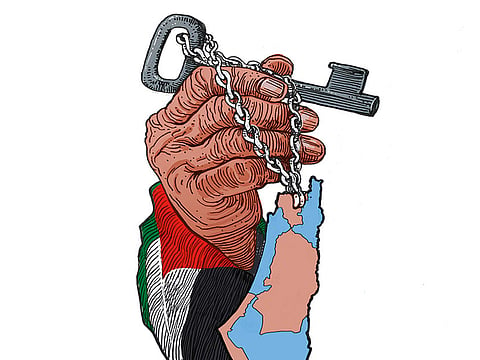The unending horror of Nakba
The violent creation of Israel took place 70 years ago, but for the Palestinian people the ‘catastrophe’ continues

Tuesday was Nakba day. Nakba is an Arabic word that can be translated as “catastrophe”. It is used by Palestinians to describe the events of 1948 that led to their ethnic cleansing. This year marked the 70th anniversary of the forced displacement of the Palestinians caused by the violent creation of Israel, when 750,000 Palestinians became refugees virtually overnight. Their descendants number 7 million today. They owned 93 per cent of the land in 1948 and lost 78 per cent of it, over 4 million acres. About 400 villages were destroyed.
Tuesday was also the day after the US moved its embassy to [occupied] Jerusalem, and the day after Israeli troops fired live bullets on unarmed demonstrators, slaughtering more than 50 people at the Gaza border. The surreal celebratory spectacle in [occupied] Jerusalem — with the messianic evangelical pastor Robert Jeffress blessing proceedings that had been boycotted by local Christian and Muslim leaders — was an alternative universe to the scenes at the Gaza border, where Palestinians were declaring that they exist as a people and have a right to return to their land as enshrined in UN resolutions. They spoke, as all subalterns do, with their bodies and their blood. This is what Donald Trump’s “deal of the century” has come to.
It is the last the last time I will commemorate the Nakba in my current office and I hope I never see another like this one. Very soon I will move on from my role as Palestinian ambassador to the UK, which I have held since 2005.
I survived four British prime ministers during my tenure. A common stand was held by both parties in their non-recognition of the state of Palestine and their unequivocal political and military support for Israel. However, with the exception of Tony Blair, the Labour party has shown more consistent and genuine support for the Palestinian cause.
There has been a dramatic shift in British public opinion, however, from majority support for Israel to increasing popular support for Palestinian human rights, and an increasing understanding of the issues, despite the mainstream media’s pro-Israeli bias.
Real divergence
The veil of Israeli spin is falling away and any fair-minded person is bound to think that when a country imprisons children for slapping a soldier and poets for writing verses of resistance, and shoots at unarmed demonstrators, there must be something very wrong. Consequently, I have seen a real divergence in the attitude of the government and the public.
On the podium, at the rallies, on the university campuses and at the public meetings, I have always been warmly received. There was no shortage of Israeli violence to prompt this grassroots support, which included three murderous Israeli bombing attacks on Gaza. Tuesday’s events are a case in point.
My reception at the Foreign Office has been less warm during my diplomatic career here. In discussions with various ministers for the Middle East, I have often felt that I was in a room with Israeli rather than British officials. I was often exasperated by the dismissal of the reasonable arguments I made.
British foreign policy as a whole has not changed dramatically in relation to Palestine. It espouses the two-state solution, but, regrettably, it has done nothing to hasten this outcome or actively support it.
It has, however, had its differences with US foreign policy in relation to conflict in the region, most recently with Trump’s killing of the Iran deal.
It has also adopted an opposed position to Trump’s disastrous decision to recognise occupied Jerusalem as the capital of Israel and move the US embassy there.
Utter despair and frustration
The Palestinian leadership again condemned the move. It has expressed its utter despair and frustration with the US administration’s unequivocal support for Benjamin Netanyahu’s extreme rightwing government and has prompted it to sever ties with the US and denounce it as a dishonest broker for peace.
The Palestinian leadership is putting its house in order with elections of new members of the PNC (the Palestine Liberation Organisation’s national council) as well as for its executive committee and central council. New strategies and political programmes are evolving to deal with the new realities.
As things stand, it is utterly hopeless to negotiate with Israel’s present government. It seems we have come to a total impasse. The regional conflict is not helping, either, and the future of the Middle East is on the brink.
Without a just solution for the Palestinians, there will never be stability. US policy, Israeli attitudes and the impotence of the Arab leaders render the Palestinians with no hope except self-reliance, and to strive to find a new vision to bolster them amid the emerging chaos.
As I bid my farewell to the UK, one of my biggest worries is the UK’s military trade relations with Israel, amounting to £19.3 billion (Dh70.88 billion). One of my deepest regrets is that I have had to leave without the British government’s recognition of the state of Palestine. I very much hope this will come, as it surely should, during the tenure of my successor.
What I will miss the very most is the solidarity of the many ordinary British people who have given me hope and solace in my darkest hours.
— Guardian News & Media Ltd
Manuel Hassassian is Palestinian ambassador to the UK.


